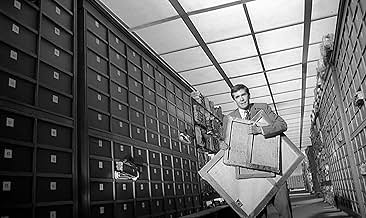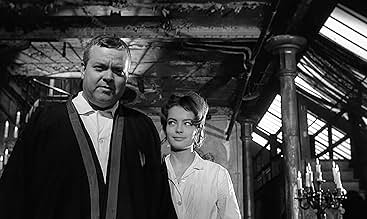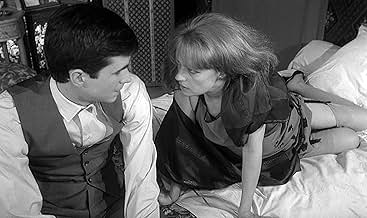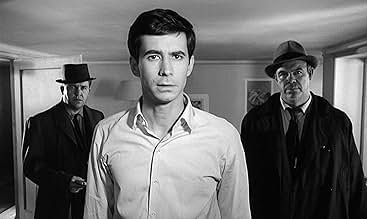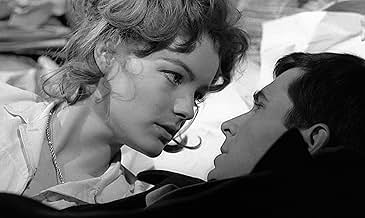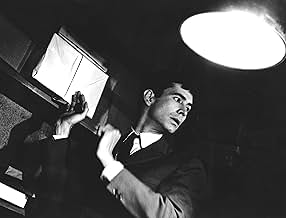Josef K., modesto impiegato di banca, apprende di essere accusato davanti a un misterioso tribunale, ma non sa perché.Josef K., modesto impiegato di banca, apprende di essere accusato davanti a un misterioso tribunale, ma non sa perché.Josef K., modesto impiegato di banca, apprende di essere accusato davanti a un misterioso tribunale, ma non sa perché.
- Regia
- Sceneggiatura
- Star
- Premi
- 2 vittorie e 2 candidature totali
- First Assistant Inspector
- (as William Kearns)
- Man in Leather
- (as Karl Studer)
Recensioni in evidenza
In 1962, Welles was struggling through his locust years. Having long since alienated himself from Hollywood's money, he was living a vagabond life in Europe, flitting back and forth across the continent to scrape funds together, plan stage productions which hardly ever came to fruition, and sleepwalk through a dozen cameo roles in other people's films. The critical and financial catastrophe of 'Chimes' was hanging over him like a pall, and he had far too many distractions - squabbles with his Irish partners, tax bills in London and potentially ruinous law suits to stave off. With all this to contend with, he was still sporadically shooting portions of "Don Quixote" in Spain, a stuttering project that was by now in its sixth year of filming. Welles was desperately short of money, and as his biographer Higham puts it, "he could manage almost anything except austerity".
A harmless, inconsequential clerk wakes up one morning to find himself accused of something (he never discovers what). Secret policemen enter his bedroom and subject him to a frightening interrogation in which every answer provokes a new line of questioning. This is psychological torture, the mind's innate sense of justice constantly probing for some higher reference-point, some appeal to fairness, when in fact none exists. Josef K returns repeatedly to the obvious question, "But what have I done?" But there are no rules of justice here, no recourse to an autonomous code of law. "You have the unmitigated gall to pretend you don't know?"
A cry of anguish from the individual who finds himself overwhelmed by soulless bureaucracy, "The Trial" is a deeply personal statement by Welles, and as Higham puts it, "a symbol, if there ever was one, of his own career". Welles had been the enfant terrible whose erratic genius had alienated the big Hollywood studios. Cut off from the big money, he was to spend the subsequent forty years globetrotting aimlessly, picking up work as best he could.
Autobiographical elements of Kafka's own life, contained in "The Trial", are given prominence in the film. Austria-Hungary launched World War One in the same year that Kafka began work on the novel. Ironically, the limited war against Bosnia, intended to restore Austria's international credibility, turned into a conflagration bigger and more horrific than anything previously experienced on earth, and set in train the global violence which was to characterise the twentieth century. It also destroyed Austria-Hungary. Welles closes this story of 1914 with an image of nuclear catastrophe, stressing the oneness of the century's horror. Kafka was bullied by his father, and reference is made in the course of the film to K's sense of filial guilt. The office is depressing and demeaning, echoing Kafka's own experiences as a clerk in a bloated bureaucracy.
The State is remorseless and pitiless, grinding down and perverting even the strongest of human bonds, those of familial and sexual love. K is forced to reject his little cousin Irmie (Maydra Shore), who has to remain 'outside'. Later, an allegation of sexual impropriety concerning Irmie arises. Any magnanimity towards another is interpreted by the authorities as a denunciation. The torture scenes involving the secret policemen are the most disturbing part of the film, both because K realises how his own protests have borne poisoinous fruit, and because of the grinning obsequiousness of the victims. The State turns its problems into spineless curs who acquiesce in their own degradation.
Not only does K find himself becoming an accuser: he even assumes the role of interrogator, questioning Bloch and the Defendants. Anyone who is not a keyholder within the pitiless apparatus of The State cannot help but take on its deadly pallor. Keys are important. Leni, the Court Guard and Zitorelli are empowered through possessing keys. They are a corrupt priesthood in this cult of political disease.
Kafka's experiences with women were deeply ambivalent. He had many intense relationships in his life, none of which proved satisfactory. His book treats women as both temptresses and objects of loathing. Welles follows this line, the women being desirable guide-figures and also deformed monstrosities. The trunk-carrier, Lena and the hunchback girl all have bodily malformations.
Welles shot most of the film in Zagreb, capturing strikingly the two clashing styles of architecture of Mittel-Europa, overblown ugly Habsburg baroque and drab communist functionalism. It is as if the Prague of Mozart cannot help but decay into the Prague of Krushchev. "Ostensibly free" is the best K can hope for, and 'ostensibly individual' is our optimum condition, as the shadows of the Stalinist apartment blocks crowd in on us.
I'm told that younger people who did not grow up with black and white TV or with black and white movies automatically tune out pieces that are not in color. That is a shame, as there are films that are better made in black and white, and expressions of time and mood that cannot be made as well in color. Welles never really got the chance to make the transition to color that Kubrick made as well as any American director. Perhaps he would have found expressive use of color as well as Kubrick did, but certainly neither this film nor Citizen Kane could be made in color.
The brilliance of its artistry aside, the film will not appeal to everyone because of the deliberate opaqueness of the plot, and because of its lack of optimism. I like Kafka's story, and I like the movie very well, but it is more art than diversionary entertainment, and some might prefer a good action flick or a romantic comedy.
For the entirety of the long scene in K's bedroom, and throughout the major part of the film, Welles positions the camera slightly below waist height. This 'wrong' spatial relationship creates in the viewer a vague sense of unease, a visual disorientation which compounds K's emotional loss of bearings. Welles plays clever tricks with the proportions of the rooms, their lines being slightly out of kilter, and the ceilings very much in view. Typically, Welles is deliberately and flamboyantly breaking a cardinal rule of cinematography - 'keep the ceiling out of shot'. Interiors seem open and spacious if we can't see the ceiling, and Welles is after the converse effect: driving home the point that K inhabits an airless, joyless place and his surroundings are imbued with inchoate hostility.
German expressionism had gripped Welles' imagination back in the 1930's, and virtually all of his films show its abiding influence. The columns of the opera house represent social regimentation, and K offends against social conformity by awkwardly pushing his way out of the theatre, an irregular irritant polluting the symmetry of the seating. When K gets caught in the exodus of workers from the office, he is both literally and metaphorically swimming against the tide. His microscopic ineffectuality against the ponderous stateliness of the courtroom doors drives home the expressionist point - he is a puny Jonah, entering the cavernous bowels of The State.
"To be in chains is sometimes safer than being free," and it could be said that Welles' genius flourished best when shackled by a dearth of resources. Lacking the money for costumes during the shooting of "Othello", Welles turned adversity to artistic advantage, filming the murder scene in a turkish bath, not only obviating the need for clothing but also making a succinct point about Iago's motives being 'stripped bare'. "The Trial" affords another example of Welles' remarkable fecundity. Zitorelli's studio is built of cheap slats and lit from outside, creating a powerful cinematic image of The State's placeman clinging precariously to his wretched privileges - all filmed at practically no expense. The skewed, empty picture frames are silent comments on the distorted and barren perspective of Zitorelli, the human race's Benedict Arnold.
K is a Freudian picaro, journeying in despair through the intestines of a nightmare system of justice, an apparatus ironically designed to ensure that justice is stifled. The shades of Buchenwald are introduced by Welles. Defendants wait with meathooks above their heads and, in other parts of this unfathomable 'system', nameless naked unfortunates stand in quiet misery, their numbers hanging from their necks. Leni and The Wife are grotesque distortions of Dante's Beatrice, malformed guides with no sense of direction and no transcendent vision. Welles himself plays Hassler the advocate, the bully who has no thought of his client's welfare but seeks only to perpetuate the cruel gavotte of litigation. "The confusion's impenetrable," a point reinforced by shooting characters through interminable patterns of beams and girders, whose shifting geometry engulfs the insignificant humans.
In his 1985 biography of Welles, Charles Higham declared "The Trial" a failure, concluding that it was "muffled, dull, unexciting on every level". Perhaps more tellingly, he criticised Welles for adopting a grandiose approach, whereas Kafka's work cries out for spareness and understatement. Higham is excellent, but the film is not, in my humble opinion, a failure. It evokes with emotional power a dreamspace of despair, and in so doing renders a great service to Kafka's oeuvre.
Lo sapevi?
- QuizIn May '62, while filming, Jeanne Moreau suffered a slight nervous breakdown due to the stifling atmosphere of the film.
- BlooperWhen Josef K. follows Hilda being carried out of the large trial room/hall by the law student, he hastily grabs and throws on his suit jacket. In the succeeding scenes, the jacket's buttons which are buttoned change.
- Citazioni
[first lines]
Narrator: Before the law, there stands a guard. A man comes from the country, begging admittance to the law. But the guard cannot admit him. May he hope to enter at a later time? That is possible, said the guard. The man tries to peer through the entrance. He'd been taught that the law was to be accessible to every man. "Do not attempt to enter without my permission", says the guard. I am very powerful. Yet I am the least of all the guards. From hall to hall, door after door, each guard is more powerful than the last. By the guard's permission, the man sits by the side of the door, and there he waits. For years, he waits. Everything he has, he gives away in the hope of bribing the guard, who never fails to say to him "I take what you give me only so that you will not feel that you left something undone." Keeping his watch during the long years, the man has come to know even the fleas on the guard's fur collar. Growing childish in old age, he begs the fleas to persuade the guard to change his mind and allow him to enter. His sight has dimmed, but in the darkness he perceives a radiance streaming immortally from the door of the law. And now, before he dies, all he's experienced condenses into one question, a question he's never asked. He beckons the guard. Says the guard, "You are insatiable! What is it now?" Says the man, "Every man strives to attain the law. How is it then that in all these years, no one else has ever come here, seeking admittance?" His hearing has failed, so the guard yells into his ear. "Nobody else but you could ever have obtained admittance. No one else could enter this door! This door was intended only for you! And now, I'm going to close it." This tale is told during the story called "The Trial". It's been said that the logic of this story is the logic of a dream... a nightmare.
- Curiosità sui creditiThe end cast credits are read over by Orson Welles without titles (though the actors are read in a different order from their listing on the screen).
- Versioni alternativeThe short version cut the opening pin screen sequence and also deleted and rearranged a number of scenes.
- ConnessioniFeatured in The Queen of Sheba Meets the Atom Man (1963)
- Colonne sonoreAdagio D'Albinoni
Interprété par André Girard (as A. Girard) et Orchestre de l'Association des Concerts Colonne
Arranged by Jean Ledrut
Music by Tomaso Albinoni (T.Albinoni)
Publisher: S.l. : Philips, 1962.
I più visti
Dettagli
- Data di uscita
- Paesi di origine
- Sito ufficiale
- Lingua
- Celebre anche come
- The Trial
- Luoghi delle riprese
- 240 Grada Vukovara Street, Zagabria, Croazia(Joseph K. and old lady lugging a trunk)
- Aziende produttrici
- Vedi altri crediti dell’azienda su IMDbPro
Botteghino
- Budget
- 1.300.000 USD (previsto)
- Lordo Stati Uniti e Canada
- 93.533 USD
- Fine settimana di apertura Stati Uniti e Canada
- 7280 USD
- 11 dic 2022
- Lordo in tutto il mondo
- 94.243 USD
- Tempo di esecuzione1 ora 59 minuti
- Colore
- Proporzioni
- 1.66 : 1
Contribuisci a questa pagina




